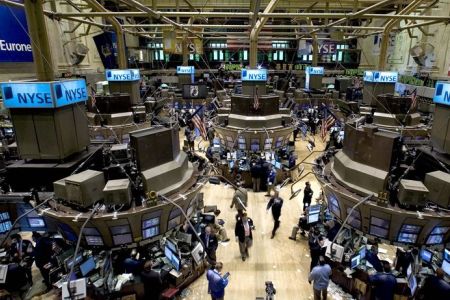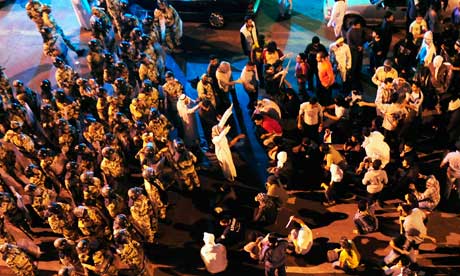Global stock markets have fallen sharply due to concerns over possible oil supply disruptions, following the spread of anti-government protests in Saudi Arabia
 Crude futures dropped early Friday, extending recent losses, as traders braced for a day of anti-government protests in oil-rich Saudi Arabia.
Crude futures dropped early Friday, extending recent losses, as traders braced for a day of anti-government protests in oil-rich Saudi Arabia.
Major stock indices in Japan, Australia and South Korea fell nearly one percent on Friday, Reuters reported. In the US, several key stock indices sank, with the Dow Jones Industrial Average falling 1.87 percent.
The unrests have triggered speculations that crude supplies form the oil-rich country -- which holds one-fifth of the world oil reserves - will be disrupted. The unsteady prospect has pushed investors to demand for safe haven assets, pushing treasuries and precious metals higher.
On Thursday, Saudi police shot and wounded at least three protesters in the eastern city of Qatif, after people poured out into the streets to demand freedom and release of prisoners.
PROTESTS DESPITE BAN
Thursday's demonstration was the latest of a series of small protests over the past three weeks in the kingdom, in which several people were arrested. 
Government officials have warned that demonstrations are forbidden because they allegedly contradict Islamic laws and society's values and said security forces were authorized to act against anyone violating the ban.
Police, who were lined up opposite the protesters, fired percussion bombs, followed by gunfire, causing the crowd to scatter, a witness said, speaking on condition of anonymity for fear of government retaliation.
Facebook groups and activists have called for protests in the capital, Riyadh, on Friday to demand democratic reforms. One such group garnered more than 30,000 supporters.
AMNESTY INTERNATIONAL CRITICIZES SAUDI VIOLENT CRACKDOWN
Earlier on Thursday, the human rights organization Amnesty International called on the Saudi Arabian authorities to reverse the ban on peaceful protest in the kingdom, amid fears of a violent crackdown on Friday's planned “Day of Rage”.
"Instead of banning peaceful protests the Saudi Arabian authorities should address the need for major human rights reform in the country," Philip Luther, deputy director of Amnesty's Middle East and North Africa program, said.
